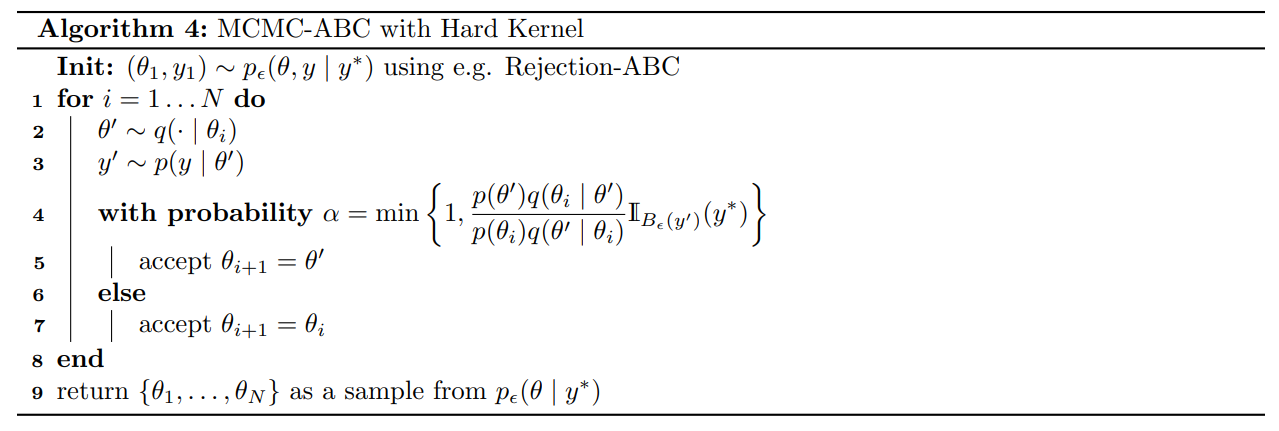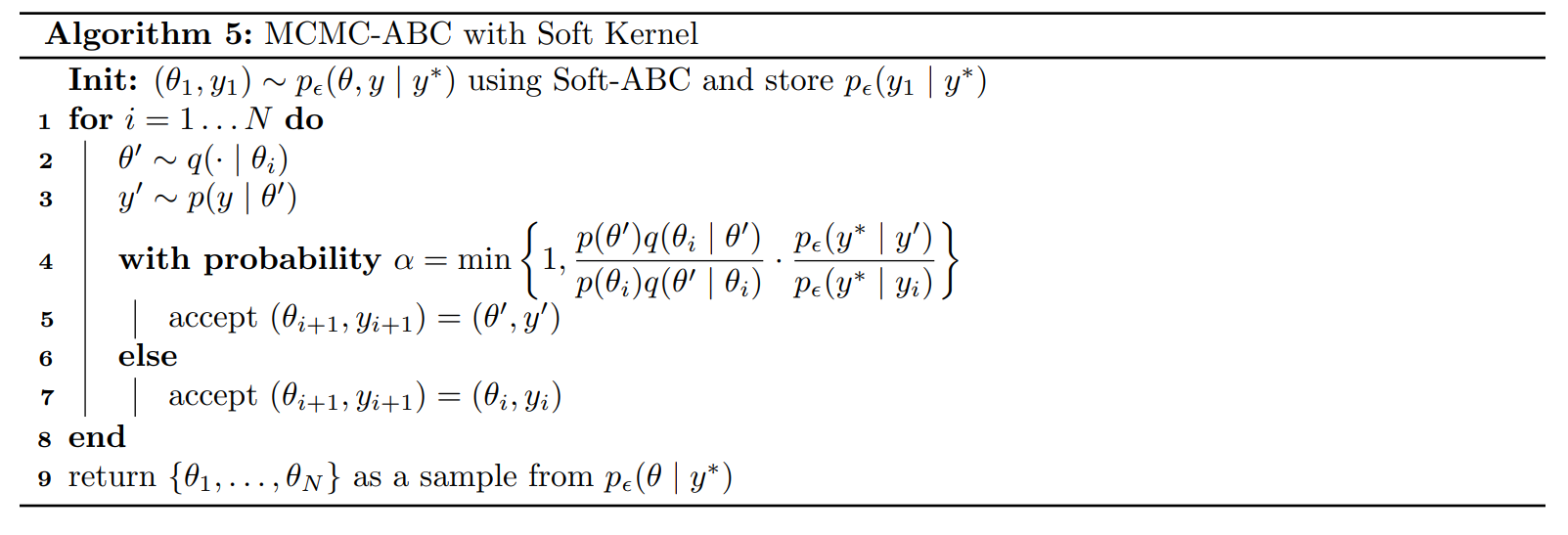Markov Chain Monte Carlo ABC
$\newcommand{\ystar}{y^{*}} \newcommand{\Ycal}{\mathcal{Y}} \newcommand{\isample}{^{(i)}} \newcommand{\kernel}{p_{\epsilon}(\ystar \mid y)} \newcommand{\tkernel}{\tilde{p}_{\epsilon}(\ystar \mid y)} \newcommand{\jointABCpost}{p_{\epsilon}(\theta, y \mid \ystar)} \newcommand{\like}{p(y \mid \theta)} \newcommand{\prior}{p(\theta)} \newcommand{\truepost}{p(\theta \mid \ystar)} \newcommand{\ABCpost}{p_{\epsilon}(\theta \mid \ystar)} \newcommand{\ABClike}{p_{\epsilon}(\ystar \mid \theta)} \newcommand{\kerneltilde}{\tilde{p}_{\epsilon}(\ystar \mid y)} \newcommand{\zkernel}{Z_{\epsilon}} \newcommand{\truelike}{p(\ystar \mid \theta)}$
MCMC-ABC
Rejection ABC could work in some simple problems but would be very inefficient in high-dimensions. We would like to come up with an algorithm that is more efficient than Soft-ABC and allows us to tackle harder problems. One idea is to use Markov Chain Monte Carlo. Specifically, we use the Metropolis-Hastings algorithm to target the augmented ABC posterior $$ \jointABCpost \propto \prior \like \kernel $$ As for any Metropolis-Hastings we would need to specify a proposal distribution $q(y’, \theta’ \mid y, \theta)$ and an initialization.
MCMC-ABC with Hard Kernel
Suppose that we use one step of Rejection-Sampling to obtain a pair $(\theta, y) \sim \jointABCpost$. Then clearly we must have that $\mathbb{I}_{B_{\epsilon}(y)}(\ystar) = 1$ or otherwise the pair $(\theta, y)$ would have been rejected by the algorithm. Now we need to choose a proposal distribution for our MH algorithm. A simple choice is as follows $$ q(y’, \theta’ \mid y, \theta) = p(y’ \mid \theta’) q(\theta’ \mid \theta) $$ which essentially means that (independently of $y$) we first sample a new parameter value $\theta’ \sim q(\theta’ \mid \theta)$ and then we feed it through the simulator to obtain a new dataset $y’ \sim p(y’ \mid \theta’)$ hence obtaining $(\theta’, y’)$. The Metropolis-Hastings acceptance probability would then become $$ \begin{align} \alpha(y’, \theta’ \mid y, \theta) &= \min\left\{1, \frac{p_{\epsilon}(\theta’, y’ \mid \ystar)}{\jointABCpost}\cdot \frac{q(y, \theta \mid y’, \theta’)}{q(y’, \theta’ \mid y, \theta)}\right\} \newline &= \min\left\{1, \frac{p(\theta’) p(y’\mid \theta’) \mathbb{I}_{B_{\epsilon}(y’)}(\ystar)}{\prior \like \mathbb{I}_{B_\epsilon(y)}(\ystar)} \cdot \frac{p(y \mid \theta) q(\theta \mid \theta’)}{p(y’ \mid \theta’) q(\theta’ \mid \theta)}\right\} \newline &= \min\left\{1, \frac{p(\theta’) q(\theta \mid \theta’)}{p(\theta) q(\theta’ \mid \theta)} \cdot \mathbb{I}_{B_{\epsilon}(y’)}(\ystar)\right\} \end{align} $$ where in the last line we have used the fact that $\mathbb{I}_{B_{\epsilon}(y)}(\ystar) = 1$ since the pair $(\theta, y)$ was generated using Rejection-ABC. Putting everything together we obtain the following MCMC-ABC algorithm by Majoram 2003.

The notebook with the code for the MCMC-ABC algorithm with Hard Kernel can be found here.
MCMC-ABC with Soft Kernel
Wilkinson 2008 generalizes this to the use of a soft kernel so that the acceptance probability now includes the ratio of the two kernels.

The notebook with the code for the MCMC-ABC algorithm with Soft Kernel can be found here.
The original paper is Markov Chain Monte Carlo without likelihoods.